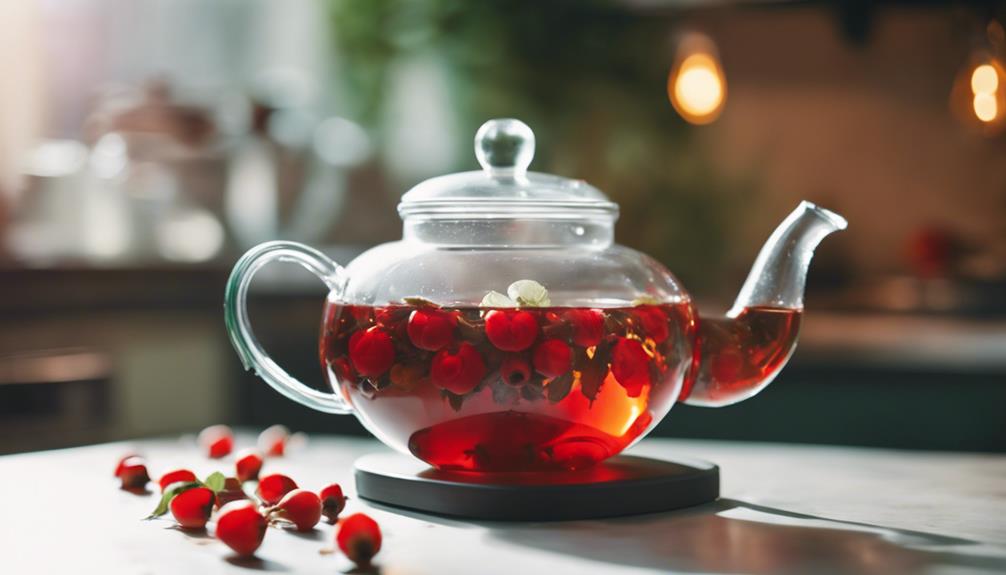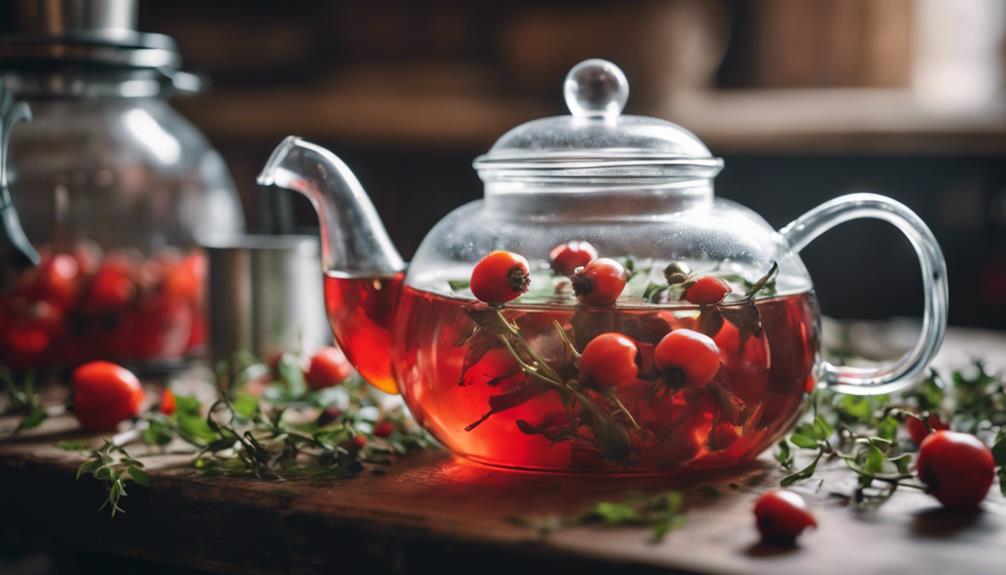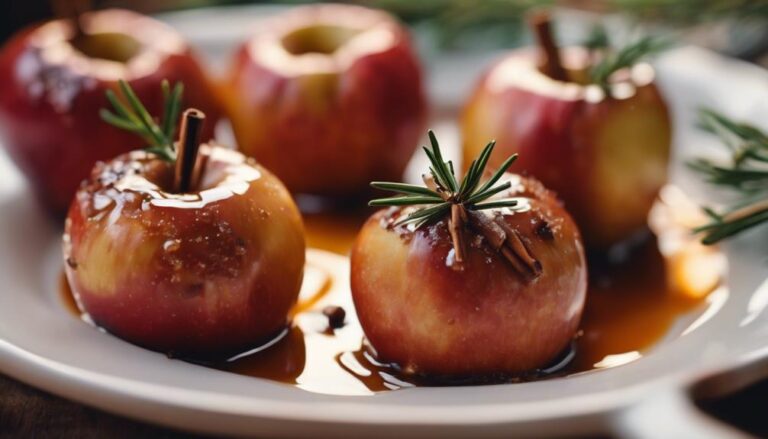Sous Vide Rosehip Tea
To perfect your Sous Vide Rosehip Tea, maintain water temperature around 200°F. Sous vide precision guarantees delicate nutrient preservation and robust flavor extraction. The technique assures a tea brimming with antioxidants and vitamins for a wholesome brew.
What You Will Learn Here
- Sous vide method optimizes flavor extraction for rich rosehip tea.
- Precisely regulate water temperature around 200°F for best results.
- Use sous vide for nutrient preservation and balanced flavor.
- Ensure accurate temperature control to avoid bitterness in tea.
- Enjoy antioxidant-rich, vitamin-packed rosehip tea with sous vide precision.
Rosehip Origins

Rosehips, the fruit of the rose plant, have gained recognition for their numerous health benefits, versatile culinary applications, and rich historical significance.
These small, vibrant fruits are packed with vitamin C, antioxidants, and anti-inflammatory properties, making them a valuable addition to various dishes and beverages.
Additionally, rosehips have been used for centuries in traditional medicine and have played a significant role in different cultures and cuisines around the world.
Rosehip Health Benefits
Hailing from the wild rose plant, rosehips are renowned for their exceptional health benefits. Rosehip tea benefits encompass a rich source of antioxidants, particularly vitamin C, which boosts immunity and fights inflammation. This superfood also contains galactolipids that help reduce joint pain and improve mobility.
Rosehip tea recipes can be tailored to maximize these advantages, ensuring you get the most out of this natural remedy. Regular consumption of rosehip tea has been linked to improved skin health, thanks to its collagen-boosting properties. Additionally, the high levels of polyphenols in rosehips contribute to better heart health and may help regulate blood sugar levels.
Embrace the power of rosehips for a healthier you.
Rosehip Culinary Uses
Originating from the wild rose plant, rosehips have a long history of culinary uses that date back centuries. These vibrant red fruits are not only packed with nutrients but are also versatile in various culinary applications. When it comes to rosehip recipes, you can explore a wide range of options from jams and jellies to syrups and sauces. Additionally, rosehips are commonly used in skincare products due to their high vitamin C content, which is beneficial for the skin. Incorporating rosehips in your cooking can add a unique flavor profile and a nutritional boost to your dishes.
| Culinary Uses of Rosehips | ||
|---|---|---|
| Recipes | Skincare | |
| Jams and Jellies | Vitamin C benefits | |
| Syrups and Sauces | Skin rejuvenation |
Rosehip Historical Significance
With a rich history spanning centuries, the origins of rosehips hold significant historical importance in various cultures around the world. Rosehips, the fruit of the rose plant, have been valued for their medicinal properties and skincare benefits since ancient times.
Historically, different civilizations have utilized rosehips for their high vitamin C content, which was essential for preventing scurvy during long sea voyages. Additionally, rosehips have been incorporated into traditional medicine for their anti-inflammatory and antioxidant properties.
In skincare, rosehips are known for their ability to hydrate and nourish the skin, promoting a healthy and radiant complexion. The historical significance of rosehips in medicine and skincare showcases the enduring importance of this versatile fruit in human culture.
Rosehip Health Benefits

Rosehip tea offers a range of health benefits that make it a valuable addition to your diet.
- Rosehip antioxidant properties: Rosehips are rich in antioxidants like vitamin C and flavonoids, which help combat oxidative stress and reduce inflammation in the body.
- Rosehip immune system boost: The high vitamin C content in rosehips supports immune function, helping your body fight off infections and illnesses more effectively.
- Improved skin health: The antioxidants in rosehip tea can promote healthy skin by protecting against damage from UV rays and enhancing collagen production for a youthful appearance.
- Digestive health support: Rosehip tea contains fiber and natural compounds that can aid digestion, reduce bloating, and support gut health, promoting overall well-being.
Incorporating rosehip tea into your routine can provide you with these health benefits, making it a simple and enjoyable way to boost your health and well-being.
Rosehip Tea Creations
Explore the art of rosehip tea infusion, where delicate flavors meld harmoniously with the natural sweetness of rosehips.
Craft a unique rosehip tea blend by combining different varieties to create a personalized taste profile.
Elevate your tea experience with a luxurious rosehip tea latte, blending creamy textures with the floral notes of rosehips for a delightful beverage.
Rosehip Tea Infusion
Consider incorporating a blend of rosehip tea infusion with complementary flavors to enhance the overall taste profile. When experimenting with rosehip tea creations, try these intriguing combinations:
- Lemon Verbena: Adds a citrusy twist that complements the tartness of rosehips.
- Ginger and Turmeric: Infuse warmth and earthiness into the tea for a robust flavor.
- Hibiscus Flowers: Enhance the tea's vibrant color and introduce a slightly tangy note.
- Vanilla Bean: Provides a sweet and aromatic undertone that balances the tartness of rosehips.
These pairings not only elevate the tea infusion process but also align with current culinary trends, offering a delightful sensory experience for your palate.
Unique Rosehip Tea Blend
To enhance the complexity of your rosehip tea blend, incorporate a carefully selected mix of complementary flavors that harmonize with the tartness of the rosehips. Consider the following to create a unique and aromatic blend:
- Vanilla Pod: Adds a sweet and creamy undertone to balance the tartness.
- Lavender Buds: Infuse a floral infusion that complements the fruity notes of the rosehips.
- Cinnamon Sticks: Provide a warm, spicy flavor that enhances the overall taste profile.
- Orange Peel: Adds a citrusy brightness that uplifts the blend with a invigorating zing.
Experiment with these ingredients to craft a one-of-a-kind rosehip tea that tantalizes your taste buds with a delightful mix of flavors.
Rosehip Tea Latte
Craft a velvety and aromatic rosehip tea latte by infusing steamed milk with the rich essence of rosehip tea.
Indulge in the frothy latte, bursting with authentic rosehip flavor.
Elevate your mornings with a homemade latte, boasting a creamy texture like no other.
Experience the perfect balance of floral notes and creamy goodness in every sip.
Create a soothing and comforting drink that envelops your senses in warmth and delight.
Unveil the art of blending rosehip tea with steamed milk to create a luxurious and flavorful rosehip tea latte. Immerse yourself in the world of homemade lattes with a twist, where the essence of rosehip adds a touch of elegance to your daily cup of comfort.
Brewing Rosehip Tea Successfully
When brewing rosehip tea successfully, focus on tea flavor extraction, water temperature control, and infusion time.
Start by considering the ideal conditions for extracting the desired flavors from the rosehips.
Maintain precise water temperature control to avoid over-extraction or under-extraction, impacting the tea's taste profile.
Pay close attention to infusion time as it plays a vital role in achieving a well-balanced and flavorful rosehip tea.
Tea Flavor Extraction
For best extraction of the rich flavor profiles in rosehip tea, make sure that the water temperature remains consistent throughout the brewing process. Tea brewing relies heavily on temperature control to achieve peak flavor extraction.
When the water temperature is too low, the infusion time will need to be extended to compensate for the lack of heat to efficiently extract the flavors. On the other hand, if the water temperature is too high, it can lead to a bitter taste due to over-extraction.
To strike the perfect balance, maintain the water temperature within the recommended range specified for rosehip tea, typically around 200°F (93°C). This precise control over temperature ensures that the flavors are extracted efficiently, resulting in a delicious and aromatic cup of rosehip tea.
Water Temperature Control
Maintain precise control over the water temperature to guarantee successful brewing of rosehip tea, optimizing flavor extraction and avoiding bitterness. When using sous vide techniques, temperature precision is key. Here's a table outlining the ideal water temperatures for brewing rosehip tea using sous vide:
| Water Temperature | Tea Steeping Time | Result |
|---|---|---|
| 160°F (71°C) | 1 hour | Light and floral taste |
| 175°F (79°C) | 45 minutes | Balanced flavor profile |
| 185°F (85°C) | 30 minutes | Rich and robust brew |
| 195°F (91°C) | 15 minutes | Intense flavor, approach with caution |
| 205°F (96°C) | 10 minutes | Bitterness may start to develop |
Infusion Time Importance
To achieve peak flavor extraction when brewing rosehip tea using sous vide, pay meticulous attention to the infusion time. Infusion techniques play a vital role in revealing the diverse flavor profiles of rosehip tea.
The duration for which the tea is infused directly impacts the intensity and complexity of its taste. Longer steeping times can enhance the tea's flavor but may also lead to bitterness. Conversely, shorter infusion times may result in a weaker taste.
When determining the best infusion time, consider the desired flavor intensity and balance. Adjusting the infusion time allows you to customize the tea to your preference and ensure consistent tea quality. Experiment with different steeping times to find the perfect balance that suits your palate.
Final Thoughts
Considering all factors discussed, the infusion of rosehip tea using the sous vide method yields a superior flavor profile and nutritional benefits compared to traditional brewing. By regulating the tea temperature precisely in a sous vide setup, you can guarantee ideal flavor extraction while preserving the delicate nutrients present in rosehips. The sous vide technique allows for a more efficient and thorough extraction of flavors from the rosehips, resulting in a more robust taste experience.
Furthermore, the sous vide method minimizes the risk of over-extraction or burning that can occur with traditional brewing methods, where fluctuations in temperature are more common. This precise control over the infusion process leads to a tea that's rich in antioxidants, vitamins, and minerals, making it not only a flavorful but also a health-conscious choice.
Frequently Asked Questions
Can Rosehip Tea Be Cold Brewed for a Refreshing Summer Drink?
If you're seeking a revitalizing summer treat, you can cold brew rosehip tea. Try experimenting with flavor combos and herbal blends for an iced infusion that will cool you down on hot days.
Are There Any Side Effects of Consuming Rosehip Tea?
Drinking rosehip tea can offer various health benefits, like boosting immunity and aiding digestion. However, be mindful of potential allergic reactions, especially if you have sensitivities to plants in the rose family.
Can Rosehip Tea Be Mixed With Other Herbal Teas for Flavor?
When mixing herbal teas for flavor combinations, consider your taste preferences. Experiment with blending rosehip tea with other herbal teas to create unique tastes. Mixing teas can enhance the overall experience by introducing new dimensions to your beverage.
How Long Can Rosehip Tea Be Stored for Optimal Freshness?
To maintain ideal freshness, store rosehip tea in an airtight container away from heat and light. The shelf life varies, but generally, it can last up to 12-24 months. Proper preservation techniques and adherence to storage recommendations are essential.
Can Rosehips Be Foraged and Used to Make Homemade Tea?
You can indeed forage rosehips to make homemade tea. Rosehip benefits include high vitamin C content and antioxidants. When foraging, look for ripe, bright red hips. Avoid areas with pesticides. Harvest carefully to not damage the plant.
Conclusion
To sum up, sous vide rosehip tea offers a unique and precise method of extracting the full potential of this beneficial herb.
With its origins dating back centuries and numerous health benefits, rosehip tea is a versatile and flavorful beverage to incorporate into your daily routine.
By following the proper brewing techniques, you can enjoy a perfectly brewed cup of rosehip tea every time, maximizing its medicinal properties and invigorating taste.











